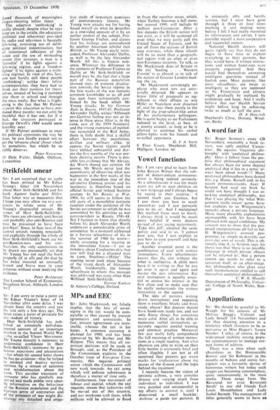Strikfeldt smear
Sir: I am surprised that no reply has been . printed to Mr Edgar Young's letter (14 November) about Herr Strik-Strikfeldt and his book Against Stalin and Hitler. That letter was so inaccurate that I hope you may allow me two sen- tences to refute some of Mr Young's disgraceful smears. He writes of Herr Strik-Strikfeldt: 'His views are obviously anti-Soviet and probably also anti-Russian and may be presumed to have been pro-Nazi'. Since, in fact, two of the central strands running repeatedly and explicitly through the whole of Herr Strik-Strikfeldt's book are his pro-Russian-ness and his anti- Nazi-ism, the only conclusions to be drawn are presumably (a) that Mr Young has not read the book properly (if at all) and (b) that he has twice smeared an unusually honest and brave man in your columns without even studying the evidence.
Peter Reddawav The London School of Economici, Houghton. Street, Aldwych, London
wc2 ' Sir : I am sorry to raise a. point on Mr Edgar Young's letter of 14 November after some delay. I was absent from the country and saw the text only a few days ago. The letter raises a point of principle for any student of history.
Herr Strik-Strikfeldt has pub- lished an extremely well-docu- mented account of an important incident in the Second World War —the so-called Vlasov Movement. Mr Young thought it necessary to undermine confidence in Herr Strik-Strikfeldt's testimony by gra- tuitous aspersions and accusations —for which his second letter shows he has no evidence—that he helped to mislead and deceive western opinion by a stream of calumny and misinformation about the USSR. This cavalier treatment of someone who has carefully pre- served and made public very speci- fic information on the behaviour of the Russian population and the German army of occupation and of the prisoners of war might dis-
courage any detached and objec- .
tive study of important questions of contemporary history. Mr Young now attacks me for having based myself on what he describes as a one-sided account of it by an earlier student of the subject, Pro- fessor George Fischer, and claims that his findings are contradicted by another American scholar (not British, as Mr Young coyly insin-
uates), Professor Alexander Dallin, as well as by the late Alexander Werth. All this is blatant non- sense. Whatever the difference in the opinions of Professor Fischer or Dallin or Mr Strik-Strikfeldt or myself may be. the fact that a large part of the Russian population showed signs of extreme disaffec- tion towards the Soviet regime in the first weeks of the war remains common knowledge to us all and
has now been substantially con- firmed by the book which Mr Young attacks. In his German Rule in Russia. 1941-45, Professor Alexander Dallin writes:`Although pro-German feeling was not so in- tense in these areas (that is, in the USSR. east of the 1939 frontiers] and the strong overtones of patriot- ism resounded in the Red Army, there is little doubt that a skilful effort between the population, civilian and military alike, to oppose the Soviet regime could have yielded substantial and dur- ins the first months of the war per- haps decisive results. There is pos- sibly less evidence that Mr Alexan- der Werth shared our opinion. Of course, Mr Werth never had the opportunity of observing what was happening in the first weeks of the war in the immediate rear of the advancing German armies and his testimony is therefore based on official Soviet and indeed Stalinist sources. In his Russia at War, 1964, he still seems to follow the old story of a monolithic patriotic reaction under the guidance of the Soviet government to which he was committed by his activities as war correspondent in Russia. 1941-44. But I happen to know that shortly before his death Alexander Werth underwent a considerable crisis of conscience. In a postcard addressed to a former schoolmate of his in the summer of 1968 he wrote— while arranging for a meeting in the immediate future—'1 am so FURIOUS about Czechoslovakia that you will find me a changed man re USSR, Brezhnev =Hitler'. The meeting never took place because of the tragic death of Alexander Werth. Incidentally, the former schoolmate to whom this message was addressed was none other than Wilfried Strik-Strikfeldt.
George Katkov St Antony's College, Oxford






































 Previous page
Previous page